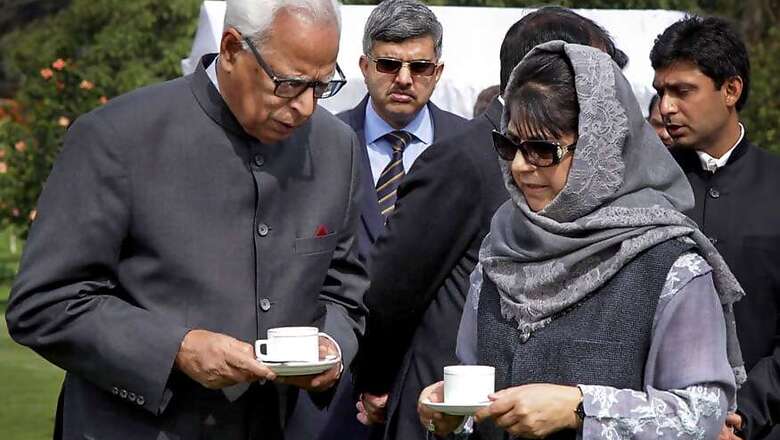
views
Peoples Democratic Party (PDP) rose into prominence within a short span of time in southern Kashmir and gradually turned it into its bastion. The party’s popularity was attributed mainly to Mehbooba Mufti, the daughter of its patron Mufti Muhamad Sayeed who played the soft separatism and human rights card right from its foundation in the year 1999.
Today after being dumped by the BJP she faces the immediate challenge of keeping her flock together and finding a way around to woo the voters in her once stronghold.
“At this stage the challenge for Mufti would be to keep the flock together given the fact that a large chunk of her MLAs and senior party leaders had lobbied against her to form government with the BJP when she was considering withdrawing support after the death of her father," says a political observer.
Former Chief Minister and National Conference vice president Omar Abdullah has even voiced his apprehensions about the BJP indulging in horse trading.
“What do you mean “we are working on something”? The only “something” would be to break other parties & make up the numbers to form a BJP govt. Has the former Deputy CM inadvertently spilled the beans?” he tweeted in response to Kavinder Gupta’s statement. The former J&K CM also demanded the state Assembly be dissolved and fresh elections be held in the Valley.
The other challenge Mufti is up to is how she would face her voters in south Kashmir who felt let down following the party’s alliance with BJP.
Political commentator Professor Noor Muhamad Baba argues that with the ending of alliance the PDP is the biggest loser.
“The party’s rise was historic in the sense that it filled the political space and was largely seen by many as somehow symbolic with the popular sentiment. In 2002, while they came to power in J&K, ties between New Delhi and Islamabad started improving and its benefits percolated on situation on ground in valley. The PDP was quick to take credit for it,” says Baba.
However, during its second stint in power with the BJP, he said everything went negative for them — ranging from strained Indo-Pak relations to escalation of violence in the valley.
“Things slipped down further after the killing of militant commander Burhan Wani. The escalation in violence in the strong hold of the party proved it beyond doubt that people felt let down by her party. So, recapturing the space she has lost in her stronghold is a beigest challenge she is confronting with,” Baba says.
He argues that she can’t even play anti-BJP card now, as it is the later which broke the alliance. “So she is left with nothing to sell and woo her disenchanted voters.”
The junior Mufti even during the peak of armed insurgency in late 90s and early years of this century would visit the villages in southern Kashmir where no other mainstream politician would dare to think of.
As the counter-insurgent force popularly called ‘Ikhwan’ formed by New Delhi to break the armed insurgency committed gross excesses against the common people and when all voices of dissent were crushed, Mehbooba would reach to these villages in southern Kashmir and register protest making her a household name.
There were many occasions when she saved youth from the wrath of army, special task force and ‘Ikhwanis’.
Its dividends were evident during 2002 Assembly elections when the party won 16 seats in its maiden turn with eleven coming from southern Kashmir alone. The PDP went on to form a collation government with Congress with senior Mufti elected as Chief Minister for first three years.
In 2008 Assembly elections even if the PDP could not form the government it increased it tally to 21 and also its vote share with south Kashmir once again giving them edge.
The strong resentment against National Conference that had ruled the state for long and their inaccessibility helped the PDP in south Kashmir.
The old loyalists and disgruntled NC and Congress workers joined the PDP while those who had remained aloof from electoral politics since eruption of militancy also saw hope in the pink-inkpot- an election symbol of the party.
Slowly and gradually the PDP made inroads into other parts of valley. The party won all three parliament election seats in 2014 from valley.
The National Conference was decimated as its president and former CM lost to PDP’s Tariq Kara in Srinagar – largely an NC bastion. Riding on the wave of growing resentment against the NC the upbeat the PDP started preparing for the upcoming elections.
With the Narendra Modi led BJP coming to power all eyes were on the party as it started campaigning on the promise of stopping the advent of saffron party into the state.
“Kashmiri won’t sell his conscience by voting for the BJP. We won’t allow the BJP here,” junior Mufti was heard telling people during road show organised in the run up to the polls in Anantnag town.
In the Assembly elections that followed south Kashmir spread over four districts of Anantnag, Kulgam, Pulwama and Shopian gave them 11 seats out of the 16 while party also gained substantial ground in Srinagar winning five out of eight seats.
The party got 28 total seats in total in the 89 member strong Assembly and with the NC and the Congress offering it an unconditional support, people especially in valley, Chenab region and Pir Panchal were expected the party to respect the mandate.
On the other hand after the BJP coming to power in Centre with a thumping majority were looking to create the history by forming government in Muslim dominated Jammu and Kashmir.
For three months, the PDP kept every one guessing but later surprised its voters when it entered into what was termed as ‘unholy alliance’.
The party’s decision was largely seen as a betrayal even as it leaders justified it saying they ought to respect the mandate of both Jammu as well as Kashmir divisions.
Senior Mufti who was sworn as CM went even to an extent of terming the alliance as coming together of North Pole and South Pole that would bring state out of uncertainty and lead it towards peace and progress. But that would hardly convince the angry people, particularly in southern Kashmir.
The support for militancy grew further with people swarming to encounter sites to save the militants and then attending their funerals becoming the norm.
The killing of popular Hizbul Mujahideen commander Burhan Muzafar Wani on July 8 in 2016 during an encounter with security forces proved last nail in the coffin for the PDP. The six-month long uprising that followed saw killing of around 100 civilians and blinding of more than 1000 as government forces used deadly pellets to curb the street protests.
The government launched a massive crackdown against hundreds of separatists and youth accused of being part of protests and booked them under public safety act.
The anger against the party who had gained popularity for pro-people and soft separatist approach grew further.
Southern Kashmir virtually became a no-go zone for mainstream politicians in general and the PDP workers in particular were socially ostracised. Their houses were attacked and ransacked both by militants and people forcing many to migrate to summer capital.
The graph of militancy also went up with young, educated youth taking up arms. The government could not even hold the parliamentary by-elections for the Anantnag Lok Sabha seat which fell vacant after junior Mufti resigned to take over as CM after the death of her father.
Now, the BJP’s pull out from the alliance has raised question marks over the survival of the party – which already is marred by internal bickering following the death of Mufti Mohammad Sayeed.
Reaching out to her own constituency and face the people who accuse her of betraying is major challenge for Mehbooba. It is to be seen whether she will again be the old Mehbooba who would even mourn the death of a militant and visit their houses in south Kashmir. Will she again play soft-separatism card. Or it is too late now.
(Khalid Hussain is a senior journalist based in Kashmir. Views are personal)


















Comments
0 comment